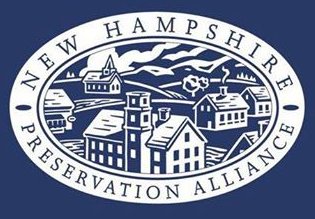Historic Preservation Gains Support at 2019 Town Meetings
Yet more action is needed in New Hampshire to save our endangered places
by Jennifer Goodman, executive director, N.H. Preservation Alliance
At town meetings across New Hampshire this year, citizens voted in favor of historic preservation, approving funds for planning studies and capital funds to research, revitalize and restore community landmarks. These results reflect a growing understanding and appreciation of historic preservation’s vital role in community and economic development.
Several towns voted to invest in properties on the New Hampshire Preservation Alliance’s “Seven to Save” endangered list. These significant and vulnerable places include the Turning Mill Pond Dam in Canterbury, Parish House in Lee and St. Joseph Catholic Church in Bartlett.
In Alexandria, Gilmanton and Meredith, town residents approved funding for studies into how to preserve their historic town halls and libraries. In Alton, Ashland, Barrington, Bennington, Bethlehem, Effingham, Fitzwilliam, Grafton, and Wilmot, voters established or added to capital reserve funds earmarked for the restoration of their local historic libraries, meeting houses, town halls and a town-owned country club house.
The state’s newest Heritage Commission was created in Kensington, while Hampton residents voted to re-establish theirs, reversing their 2015 decision to disband it. Voters in Francestown, Loudon and Troy adopted use of RSA 79-E, a tax incentive program that offers tax relief for municipalities to encourage investment in downtowns and historic buildings. While a first attempt to pass 79-E failed in Kingston, nearly 40 New Hampshire towns now offer this tax incentive program.
The Preservation Alliance sees these positive votes as a reflection of the growth in statewide support for saving and stewarding New Hampshire’s special places. As our world feels faster and flatter, long-time residents and newcomers alike are rolling up their sleeves and doing more in their local communities. Part of this trend involves incorporating strategies to preserve old buildings that provide a variety of social, environmental and economic benefits.
The French-Taylor House in Moultonborough was spared from demolition by a town meeting vote in March that was brought forward by the town’s Heritage Commission.
The repair and restoration of old and historic buildings often draws on local labor and materials, supporting jobs and invigorating local economies. Many older buildings feature energy-efficient designs, with south-facing facades, pitched roofs, and awnings and shutters that accommodate local climate. Conversely, it can take 10 to 80 years to recapture the energy lost when a new building is constructed to replace an old one.
Recent surveys show millennials prefer a mix of old and new buildings in the places where they live, dine and shop. Findings also reveal that heritage tourists – those who seek out cultural heritage destinations – stay longer and spend more than other visitors.
As the state’s only nonprofit organization devoted to leadership, education and advocacy for historic preservation, the Preservation Alliance celebrates this growing interest in preservation. These votes reflect not just fondness for old architecture, but rather, rising recognition that investments in preservation protect local property values and stimulate social and economic growth.
Despite these recent success stories, challenges lie ahead. Changing demographics and land-use patterns in New Hampshire are leaving farms and barns, waterfront properties, churches, meetinghouses and downtown buildings under-used and vulnerable. Suburban sprawl, “new is better” attitudes and intractable parking and complex property issues often lead to the loss of irreplaceable historic assets.
If we are to sustain New Hampshire’s heritage and historic character, more individuals and communities need to step up, explore and invest in pro-preservation actions and policies. The N.H. Preservation Alliance is here to assist community leaders and property owners with coaching, workshops, technical assistance, planning grants, and other services. Working together, we can support the growing momentum across the state toward valuing, investing in and preserving the distinctive character of communities across New Hampshire.

